4. Public Oversight
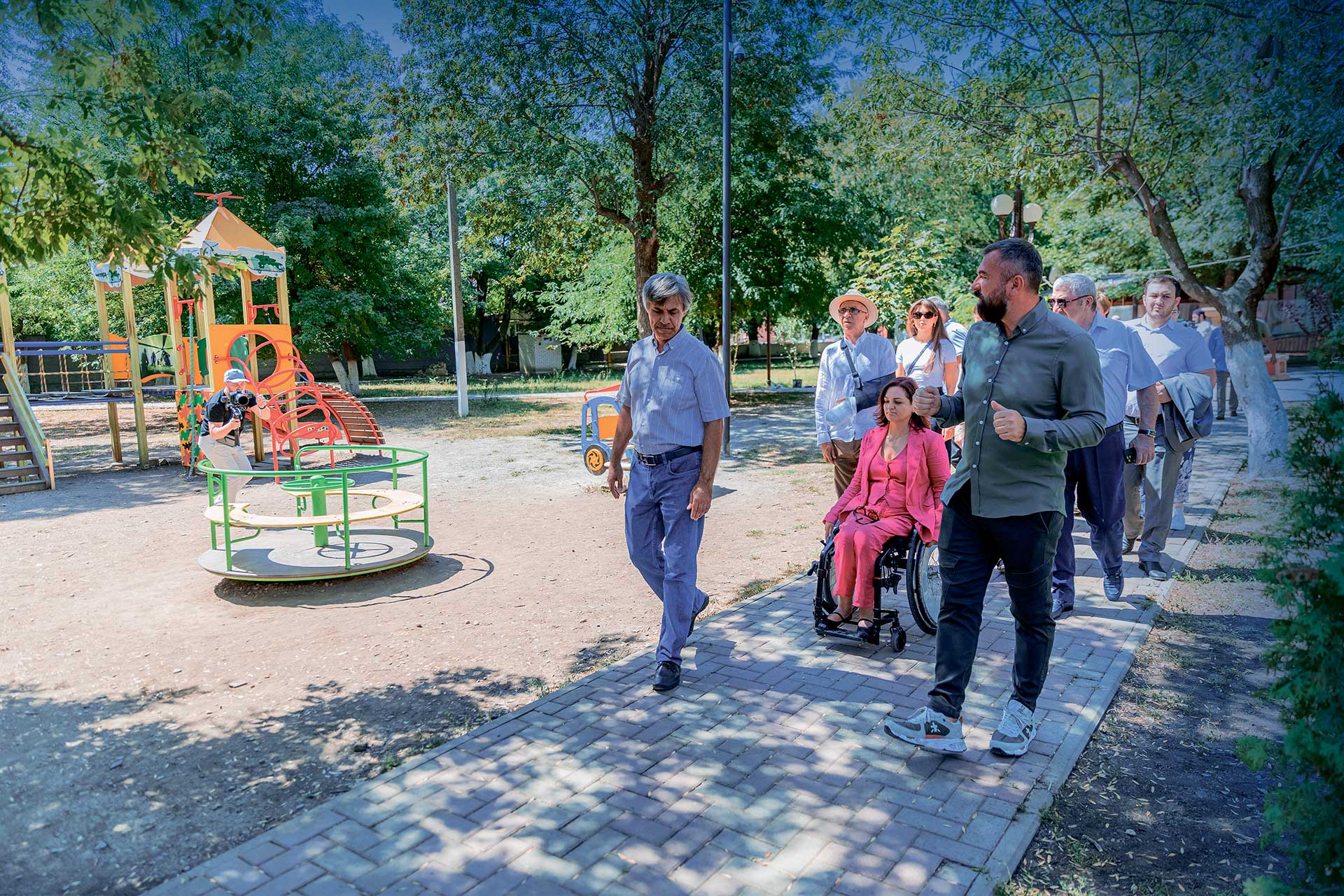
Public inspection of urban infrastructure objects in the Republic of Ingushetia within the framework of the Zero-day of the “Community” forum. August 21, 2024. Press Service of the Civic Chamber of the Russian Federation
In 2024, it marked a decade since the adoption of a fundamental federal law in the Russian Federation setting the legal framework for organizing and exercising public oversight over the activities of authorities at all levels and other bodies and organizations exerting separate public powers.97
The adoption of the Public Oversight Law in 2014 was a significant step forward in the development of civil society in the Russian Federation and, in a sense, an act of trust by the state authorities in the Russian civil society.
Public oversight—a new standard of state-civil society relations
Over the past ten years, significant progress has been achieved in the development of the institution of public oversight in the Russian Federation. Currently, public oversight is not only one of the key instruments ensuring transparency and openness of the activities of state authorities, local self-government bodies, and other bodies and organizations in the exercise of their public powers, but also effectively a new standard of state-civil society relations and an actual mechanism of direct democracy consistently evolving in our country.
Additionally, public oversight has become one of the important tools for fostering international dialog with civil society organizations from foreign countries. For example, on March 27, 2017, a model law “On the Basics of Public Oversight” was adopted by resolution № 46-19 of the Interparliamentary Assembly of the CIS member states in Saint Petersburg.
However, the decade of practical application of the Law on Public Oversight has revealed certain gaps and legal contradictions, which dictate the need for its further improvement.
Particularly noteworthy are the following points:
Establishment of a concrete mechanism for implementing the provision mandating authorities and other bodies and organizations to consider the proposals, recommendations, and conclusions of public oversight subjects, along with the legal consequences of failing to do so;
More detailed regulation of the forms and mechanisms of interaction between public oversight subjects and the authorities, other bodies, and organizations, including the legal implications of such interaction;
Establishment of administrative liability for noncompliance with the legislation of the Russian Federation on public oversight, including obstructing the lawful activities of public oversight entities;
Reduction in the timeframe for consideration of inquiries (appeals) and the final documents from public oversight subjects by the authorities, other bodies, and organizations;
Resolution of issues and specification of particular cases in which public oversight subjects can exercise their right to approach the court to protect the rights of an indefinite circle of individuals, as well as the rights and legitimate interests of public associations and other nongovernmental nonprofit organizations.
Public oversight is not so much an observation of the activities of authorities at all levels, as it is a mechanism for protecting the rights and freedoms of individuals and citizens.
The application practice of the Federal Law on Basic Principles of Public Oversight in the Russian Federation also highlighted the issue of the training and enhancement of the qualifications and legal literacy level of public inspectors.98 Public oversight serves not merely as an observation of the activities of authorities at all levels and other bodies and organizations vested with distinct public powers but as a mechanism for protecting the rights and freedoms of individuals and citizens, and the rights and legitimate interests of public associations and other nongovernmental nonprofit organizations. Consequently, public inspectors cannot substitute for controlling and law enforcement agencies with their actions, but should become real assistants to authorities, other bodies, and organizations through conducting public oversight activities, identifying systemic socially important issues, and formulating recommendations and proposals for their prompt resolution in close cooperation and constructive dialog with authorities, other bodies, and organizations.
This situation underscores the necessity of developing educational programs and qualification enhancement for public inspectors which include practical tasks related to initiating and performing various forms of public oversight, terms for citizen participation in public oversight events, rights and obligations of public inspectors, interaction procedures between public oversight subjects and authorities, other bodies, and organizations, and other significant provisions.
The organization and conduct of various forums and conferences at the all-Russian, interregional, and inter-municipal levels are seen as a promising direction, contributing to the legal literacy of public inspectors, whereby public oversight subjects can share best practices, discuss specific aspects of public oversight implementation, and receive practical skills.
Efforts to popularize the institution of public oversight and engage more active citizens, including youth, fostering their interest in public activity, and developing skills necessary for implementing public oversight will also be facilitated by:
Organization and conduct of various informational campaigns, including those based in higher education institutions, aimed at increasing citizens’ awareness of the goals, tasks, and forms of public oversight, and the possibilities for citizen participation in it;
Holding contests to identify best practices of public oversight implementation in various spheres of public relations and recognizing the most active and effective public inspectors;99
Development and implementation of nonmaterial incentives for public inspectors100 directed at enhancing their motivation and acknowledging their achievements.
Institution of public councils under government bodies
The legal regulation regarding the formation of public councils within federal executive bodies traces back to August 2005, when the Government of the Russian Federation adopted Decree No. 481. This decree regulated the formation of public councils at federal ministries, for which the Government of the Russian Federation exercises leadership, as well as at federal services and agencies subordinate to these ministries, and other federal services and agencies managed by the Government of the Russian Federation.
A year later, the President of the Russian Federation issued Decree No. 842, which governs the formation of public councils at federal ministries, federal services, and federal agencies, whose operations are directed by the President of the Russian Federation, including those that are subordinate to these federal ministries.
While public councils at federal executive bodies do not possess any authoritative powers, they have actively facilitated the participation of citizens in addressing socially significant issues within the scope of competence of government bodies and organizations.
Since 2014, public councils have been legally classified as subjects of public oversight. This means that, in addition to their advisory and consultative functions as specified institutions of civil society, they have also been given the role of monitoring the activities and decisions of government bodies and organizations.
A prime example of active collaboration between government bodies and civil society institutions is the establishment of public councils at federal executive bodies.
In 2024, there were 49 public councils101 functioning at federal executive bodies managed by the Government of the Russian Federation. Of these, 16 were at federal ministries, 20 at federal services, and 13 at federal agencies.102 Additionally, 11 public councils were established at federal executive bodies under the President of the Russian Federation.103
In total, the public councils at federal executive bodies, managed by the Government of the Russian Federation, include over 1,200 members.104 The formation of public councils at government bodies is conducted on a competitive basis, with the Civic Chamber of the Russian Federation organizing the selection process.
In 2024, the Civic Chamber of the Russian Federation, as the organizer
of the
competition for public councils at federal executive bodies, conducted
51 competitions.
These included 27 primary selection competitions for candidates to become members of public councils, and 24 competitions to replace outgoing members and for the additional recruitment of candidates.
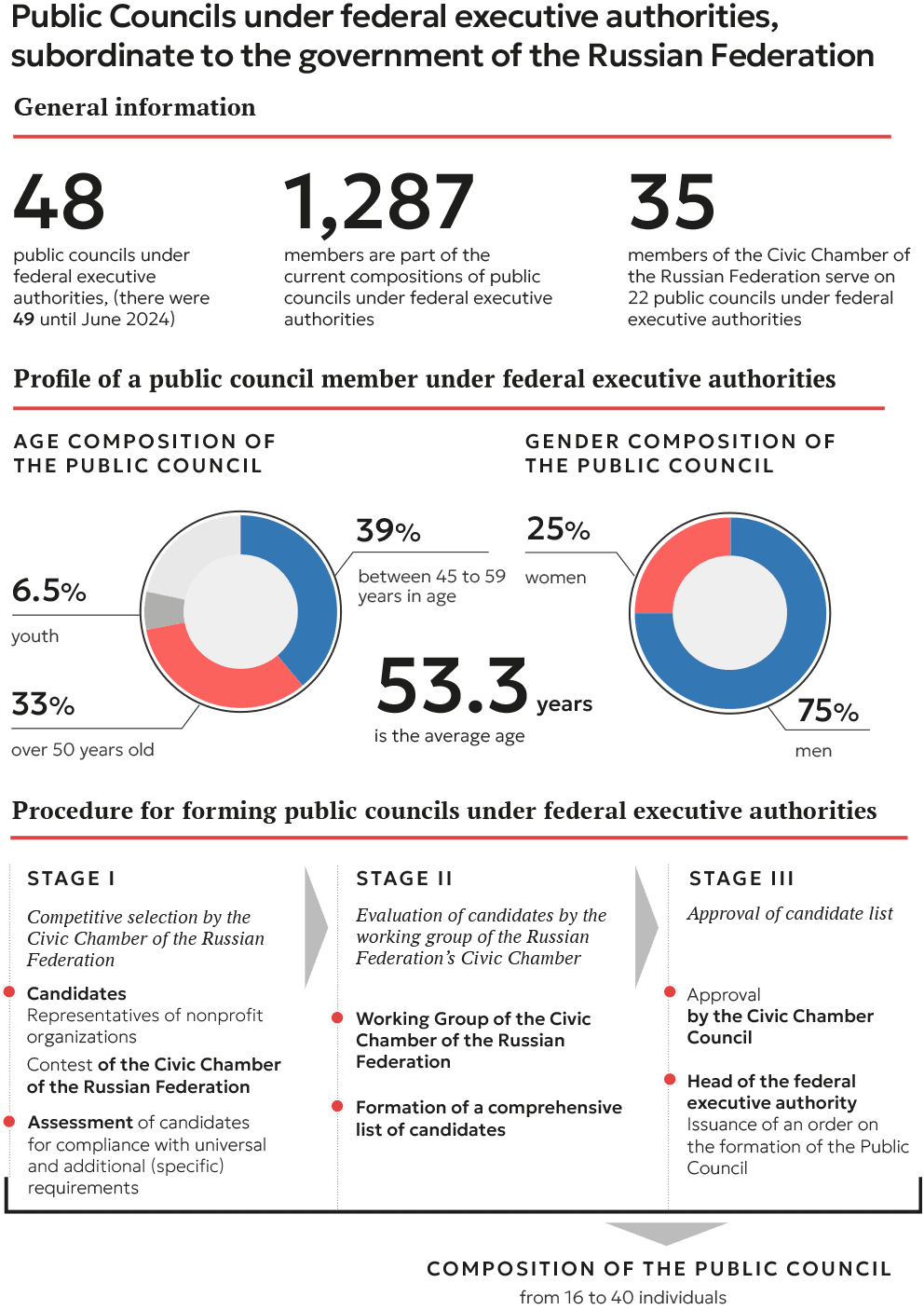
The activities of public councils become particularly significant at regional and especially municipal levels, where it is crucial to quickly communicate citizens’ well-reasoned positions on proposed or existing socially significant decisions to the authorities.
The effectiveness of public councils at regional and municipal government bodies remains a traditional topic of discussion across various platforms, including the Civic Chamber of Russia. Wide powers of public councils, secured at the legislative level, and the extensive involvement of the population in the work of public councils, combined with the absence of a unified system and approaches to organizing the activities of public councils in the regions of the Russian Federation, have generated considerable interest among those involved in ensuring public oversight and those interested in this area of activity. This has created a demand for both the most basic materials (on the formation of councils, on organizing their activities) and unique practices (approaches to quantitative and qualitative composition of councils, features of presenting the results of councils’ work in the public space, etc.) regarding the activities of public councils at the regional and municipal government levels.
In 2024, the Civic Chamber of Russia conducted a large-scale study of the practices of forming and organizing the activities of public councils at regional and municipal government levels, resulting in the preparation of a Special Report “On the State of Public Councils under Regional and Municipal Authorities.”
The Special Report reflects various topics in the practical formation and organization of public councils at regional and municipal levels: legal regulation of the creation and functioning of public councils, approaches to forming the composition of public councils, a profile of public councils was formed, addressing issues of providing methodological support to public councils and evaluating the effectiveness of their activities, and summarizing and forming the most relevant proposals to improve the efficiency of public councils.
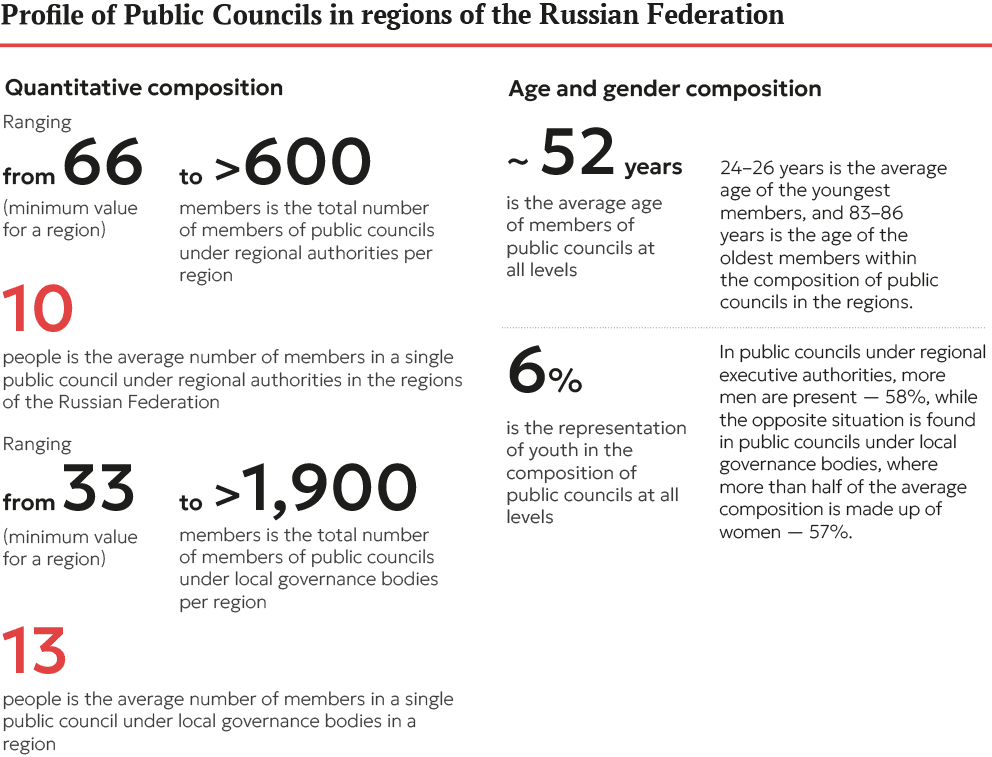
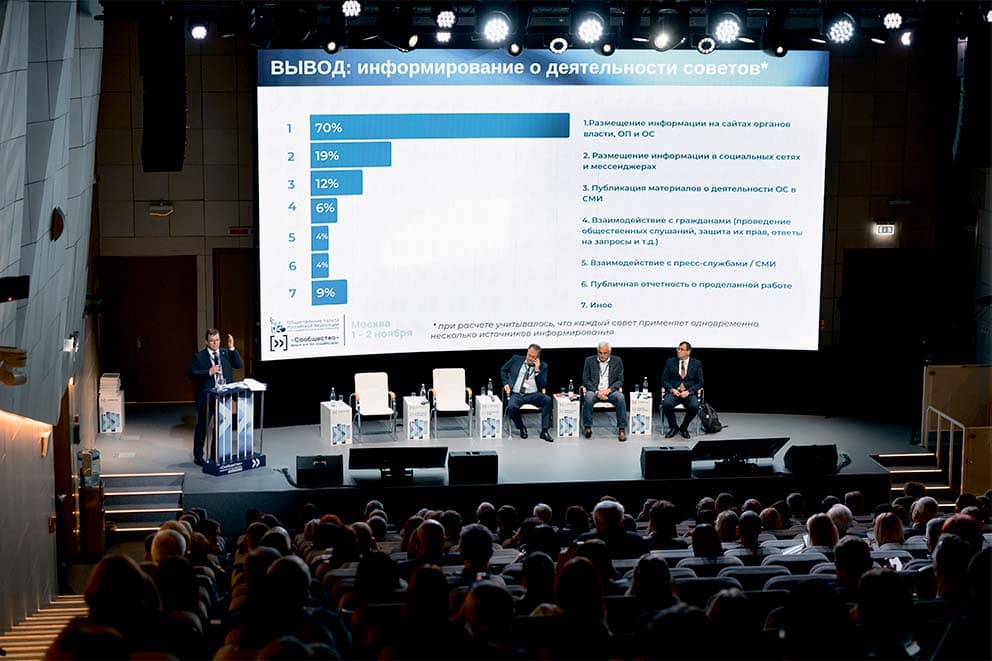
Presentation of the Special Report by the Civic Chamber of the Russian Federation “Public Councils under Federal and Regional Executive Authorities: Problems and Prospects” within the framework of the final forum “Community” in Moscow. November 2, 2024. Press Service of the Civic Chamber of the Russian Federation
The study identified a number of systemic issues in the activities of public councils under regional authorities and local governments:
-
The majority of the Russian Federation’s entities have adopted processes for forming public council memberships, assessment methods, and selection criteria for candidates that lack transparent and understandable procedures to ensure the objectivity of public council formation, and to guarantee its autonomy, impartiality, and independence from the authority under which it is created.
-
In the overwhelming majority of cases, the procedure for forming public councils under local governments is not transparent. Decisions on the inclusion of certain candidates in the public council are most often made directly by the head of the local administration without any competitive procedures and without the involvement of the regional or municipal civic chamber.
-
The legislative status of public councils as entities of public oversight under local governments and territorial branches of federal executive authorities, operating in several Russian Federation entities, is not defined.
-
The publicity and openness of public council activities are not properly ensured.
-
Generally, there is no unified methodological basis for the activities of public councils in the regions, and existing successful practices of public council activities are not scalable.
-
The assessment of the effectiveness of public councils under regional authorities and local governments is also not systematic. A unified methodology for conducting such an assessment at the regional and municipal levels is absent.
The current situation necessitates improving the legislation of the Russian Federation to establish uniform legal regulation throughout the entire territory of Russia concerning the creation and functioning of public councils under state authorities of the regions of the Russian Federation, public councils under local governments, and civic chambers (councils) of municipal entities.
Public inspections as an effective tool of public oversight
One form of public oversight that allows for on-site evaluation of compliance by authorized bodies and organizations with the requirements of Russian Federation legislation, identifying not only existing problematic issues but also the best practices for further dissemination, is public inspection.105
This year, the Civic Chamber has intensified its activities in this area: by the decision of the Civic Chamber Council, a series of public inspections were conducted across various public relations fields.
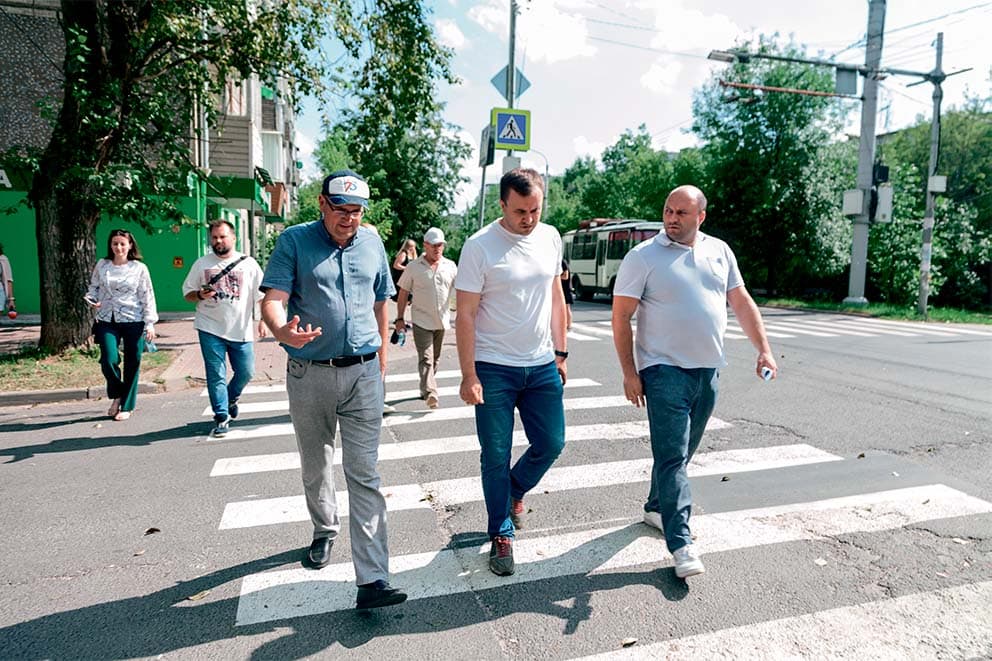
Public inspection of transport infrastructure in the city of Kaluga within the Zero-day of the “Community” forum. July 17, 2024. Press service of the Civic Chamber of the Russian Federation
For the first time in 2024, within the framework of the “Community” forums, initiated by the Civic Chamber’s Commission on Physical Culture, Sports, and Healthy Lifestyles, a series of public inspections were conducted on street sports infrastructure objects such as skate parks, workout, and parkour sites in Irkutsk, Kaluga, and Magas. To create a new system for evaluating and monitoring the quality of newly created sports facilities, dozens of experts were involved in assessing various parameters of specialized infrastructure oriented towards street sports.
The inspections resulted in serious concerns regarding several sports facilities, and recommendations were made for the executive authorities to address the identified deficiencies. However, despite detailed analysis and expert recommendations from the Civic Chamber of Russia, most facilities continue to operate in their original state, posing dangers to children, teenagers, and athletes who use them. Some facilities are under investigation by the investigative committee or the prosecutor’s office.
According to experts from the Civic Chamber, addressing such issues systematically requires considering the creation of a new public structure responsible for the access and acceptance of specialized sports infrastructure facilities. This initiative would involve the communities for whom these facilities are designed.
At the initiative of the Civic Chamber Commission on Safety and Cooperation with the Public Supervisory Commission, in partnership with the Main Directorate for Road Traffic Safety of the Ministry of Internal Affairs of Russia and the Information Center for Motor Roads “Informatodor,” a nationwide informational project called “Road Traps” is being implemented in the Civic Chamber.106 This project aims to identify sections of Russian roads where conditions have been artificially created that encourage motorists to violate traffic rules and to facilitate the prompt resolution of these problematic zones. Any resident of the country can report problematic road sections by filling out a special form107. The submissions received under the “Road Traps” project provide the basis for initiating and conducting public inspections,108 after which information about identified violations and recommendations for their elimination and road situation improvement are sent to the authorized bodies. For instance, during public inspections in the cities of Tula,109 Smolensk,110 Tver,111 and Voronezh, over 20 road sections were examined in total to analyze the current state of organization and regulation of road traffic in these cities, assess compliance with the requirements of the Traffic Rules in the Russian Federation and other regulatory legal acts in the field of road safety, and identify instances of violations (“Road Traps”).
Traditionally, during the Zero-day of the “Community” forums, members of the relevant Civic Chamber commissions evaluate:
-
The quality of roads, social and communal infrastructure objects improved under the federal project “Formation of a Comfortable Urban Environment”; the operation of sewage and heating facilities, as well as the progress of the program for the relocation of citizens from unsafe housing.114, 114.1
-
The condition of sports facilities and the development of sports infrastructure. 115, 115.1, 115.2
-
The operation of transport and the development of transport infrastructure, including the territorial connectivity of regions.116
The results of the inspections are subsequently discussed at thematic sessions of the “Community” forums with government authorities, regional residents, and the professional community.
Based on the public inspections conducted, reports have been prepared containing recommendations for the authorized government bodies of the respective subjects of the Russian Federation, aimed at increasing the efficiency of the existing regulatory system in these areas.117, 117.1
In August of this year, the civic chambers of the regions of the Russian Federation, with the assistance of the Civic Chamber, conducted an inspection of the work of medico-psychological consultation offices in state medical organizations, including their equipment according to approved standards.112 In total, the public inspection covered more than 230 state medical organizations in 36 regions of the Russian Federation.113
The results of the inspection showed that practically in all medical organizations (98%) where the public inspection took place, medico-psychological consultation offices have already been established. In most of these, the recommended staffing standards (one medical psychologist position per 25,000 population) were fulfilled, and the equipment standards, including an automated workplace with Internet access and a voice recorder, were met (74%). At the time of the inspection, in 83% of cases, the medico-psychological consultation offices were open for patient visits. In 69% of medical organizations, in addition to appointments made through the “doctor-to-doctor” system (i.e., appointments scheduled via a primary care physician based on medical indications), patients could independently make electronic appointments with a medical psychologist through the medical organization’s information kiosk or the Unified Portal of State and Municipal Services. In all medical organizations, assistance by a medical psychologist in the medico-psychological consultation office was provided free of charge.
During a public review, medical psychologists noted an increase in requests for professional medico-psychological assistance from participants of the special military operation and their family members. This underscores the need for enhanced methodological support for the work of medical psychologists dealing with combat participants and their families.
The examples provided above, along with many others, demonstrate the effectiveness of the mechanism of public reviews aimed at identifying current issues of genuine concern to the population, developing measures to address them, and reducing social tension in society.
To enhance the effectiveness of public reviews in various areas of social relations, develop a unified approach to their conduct, improve the legislation of the Russian Federation in this sphere, and attract public attention to the conduct and popularization of public reviews, it is crucial to ensure the consolidation of positive experiences, systematize them, and subsequently spread and implement their best practices in the activities of entities engaged in public oversight throughout the Russian Federation.
This year, on the initiative of the Civic Chamber’s Commission on Public Oversight and Work with Citizens’ Appeals, the Civic Chamber developed methodological recommendations for conducting public oversight in the healthcare sector. These recommendations focus on public reviews of the activities of medical organizations within the state and municipal healthcare systems, as well as other medical organizations providing healthcare services under the program of state guarantees for the free provision of medical care to citizens, in accordance with the legislation of the Russian Federation.
Public review of draft regulatory legal acts
One significant form of public oversight, which allows for public access to the legislative process, is the public review of bills and other regulatory legal acts with particular social significance.
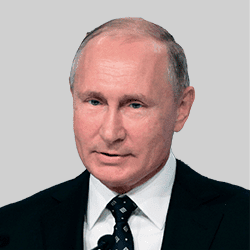
“Today’s Russia requires broad public debate that would yield practical results, when public initiatives become part of public policy, while society monitors their execution.
I think that all bills, key government decisions, and strategic plans should pass a so-called initial public hearings involving NPOs and other civil society institutions.”118
— V.V. Putin
President of the Russian Federation
Representatives of the Civic Chamber of Russia, as one of the key institutions of civil society, are actively involved in the legislative process, effectively interacting with government authorities.
An example of such interaction is the public review of the federal bill No. 639663-8 “On Amendments to Parts One and Two of the Tax Code of the Russian Federation and Certain Legislative Acts of the Russian Federation.”
Civic Chamber participated in the discussions of this bill starting from the stage of developing the legislative initiative. On May 20, 2024, during a meeting of the Expert Council of the State Duma Committee on Budget and Taxes, representatives of the Civic Chamber actively participated in the discussion of the proposals of the Government of the Russian Federation to improve tax legislation,119 along with representatives of the legislative and executive authorities. Later, with the participation of representatives from all 89 regions (both in person and via video conference), members of the Civic Chamber delivered speeches at the State Duma of the Federal Assembly of the Russian Federation during parliamentary hearings.120
Following the parliamentary hearings, recommendations were prepared,121 which the authors of the federal bill No. 639663-8 “On Amendments to Parts One and Two of the Tax Code of the Russian Federation and Certain Legislative Acts of the Russian Federation”122 relied upon during the drafting process.
Prior to the public discussions held in the Civic Chamber on June 10, 2024, the bill was discussed by civic chambers in the regions of the Russian Federation. The Civic Chamber of Russia consolidated and presented the positions of 45 regional civic chambers during the public review.
Participants in the public discussion supported the federal bill, emphasizing that the proposed innovations are citizen-oriented and aimed at Russia’s development. In discussing provisions of the bill that provide for the introduction of a progressive taxation scale, participants in the public hearings expressed confidence that a progressive scale would contribute to reducing inequality and income redistribution.
However, experts highlighted the importance of considering the specific labor conditions in the Far North regions and equivalent localities, where salaries are calculated with the so-called northern allowances and regional coefficients. Later, the President of the Russian Federation noted that in the new progressive personal income tax scale, the allowances for work in the Far North should not be considered.123
Additionally, participants in the public review proposed ensuring the possibility of applying a reduced insurance contribution rate (7.6%) for charitable nonprofit organizations, similar to the measures provided in the bills for insurance contribution payers recognized as small or medium-sized enterprises engaged in certain types of economic activities.
During the public discussion, it was noted that, given the increase in state revenue, it is important to ensure the effectiveness of its expenditure. For this purpose, there is currently relevant instrumentation available. The Government of the Russian Federation has built a digital control system that allows real-time monitoring of delays in deadlines and deviations from target values.124
Summarizing the results of the public review, the participants unanimously agreed that the proposed federal bill is the result of constructive dialog and detailed discussion of the proposed amendments by civil society in cooperation with government authorities. The proposed changes aim to determine long-term sustainable sources of financing for budgetary obligations, which, in turn, will help achieve national development goals and ensure well-being and decent living conditions for every citizen.
Overall, the Civic Chamber conducts public reviews on up to 30 draft regulatory legal acts annually.
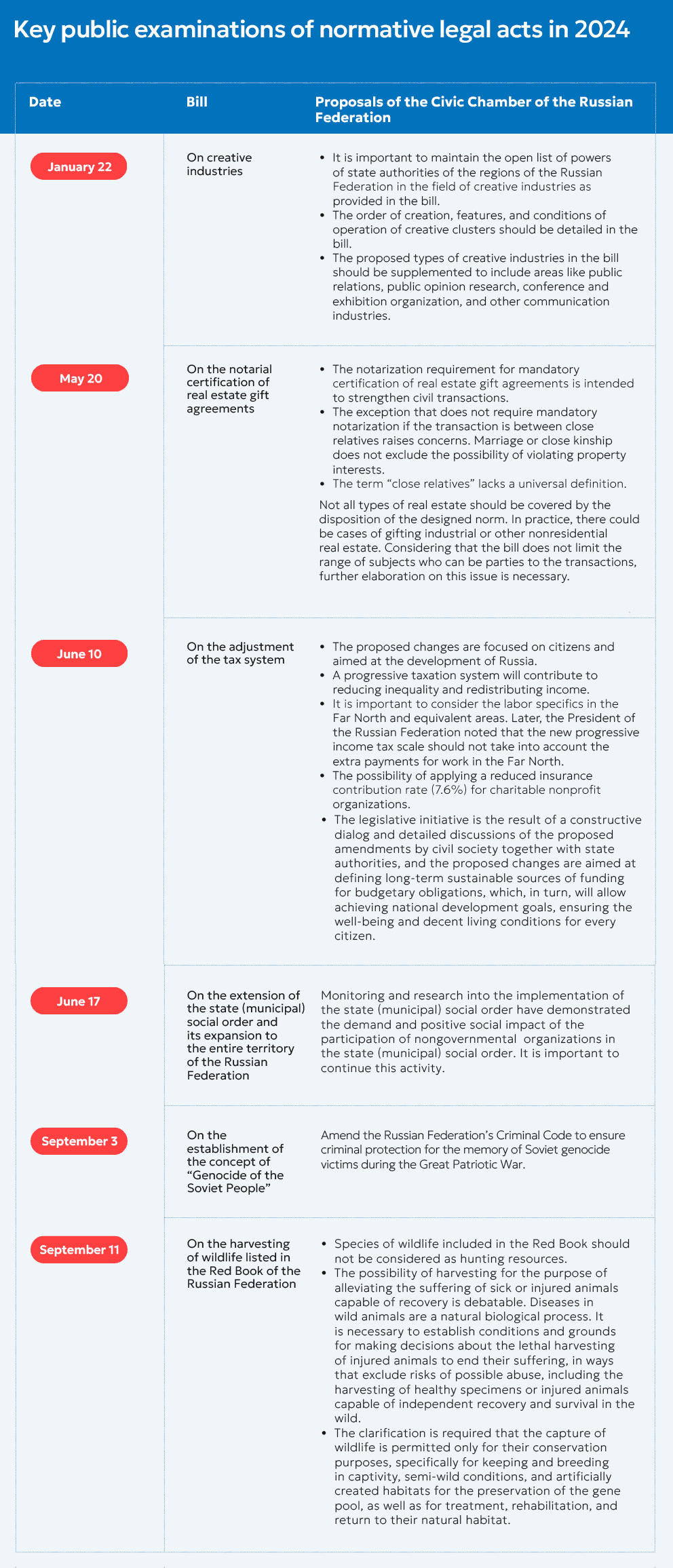
- 2024: The Main Topics in Russian Civil Society
- Civil Society and the State
- Institutions of civil society as catalysts for social change
- Collaboration and cooperation between society and the state
- Consolidated efforts of public institutions to support Special Military Operation veterans
- Public participation in achieving national development goals
- 2024 — the Year of the Family
- Nonprofit organizations: a means for partnership between the state and society
- Interaction of the institution of commissioners in the Russian Federation with civil society
- Social investments as a state contribution to developing the civic potential of the nation
- Institutions of civil society as catalysts for social change
- Citizen Observation
- Public Oversight
- Citizen Appeals
- Public Diplomacy
- Conclusion. Public Initiatives for a New Era